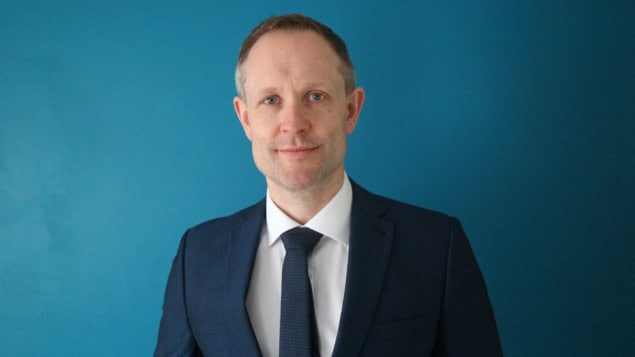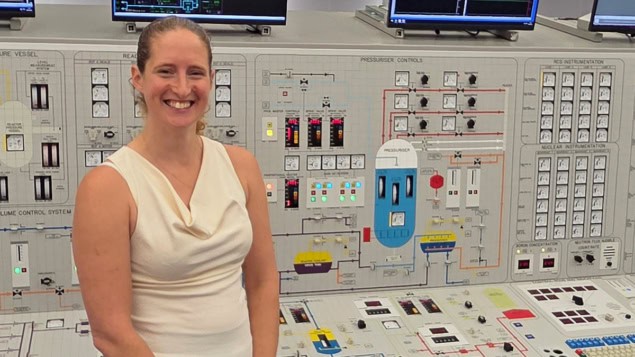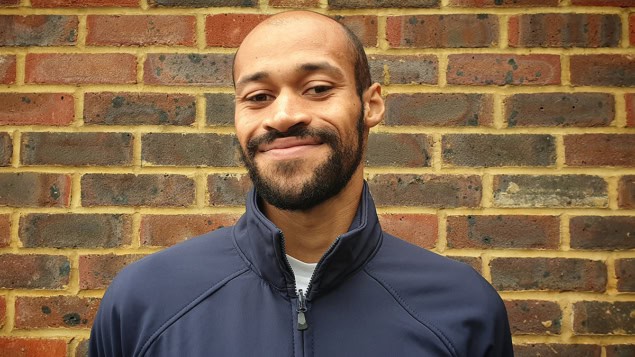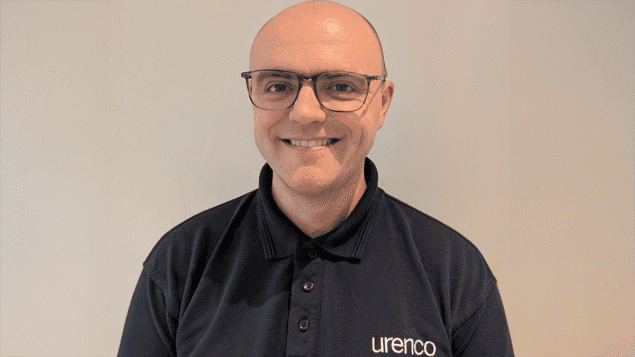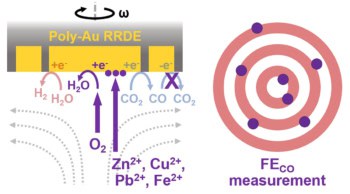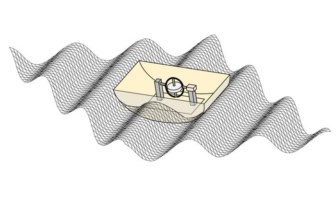With the push to move away from fossil fuels, the UK is turning to nuclear power. New reactors are being built and new technology is being developed, but there is a skills shortage. Sarah Tesh talks to six physicists working across the nuclear energy industry, highlighting how a background in physics can open many doors in this expanding sector
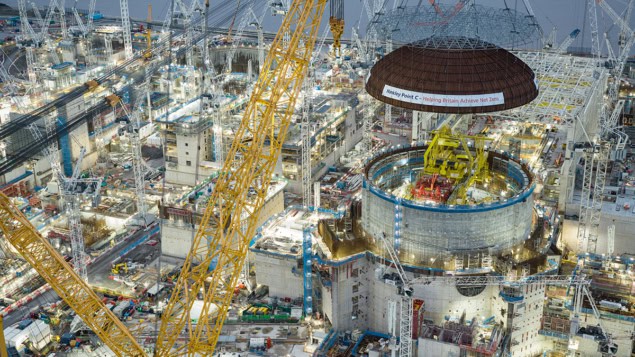
Nuclear power in the UK is on the rise – and so too are the job opportunities for physicists. Whether it’s planning and designing new reactors, operating existing plants safely and reliably, or dealing with waste management and decommissioning, physicists play a key role in the burgeoning nuclear industry.
The UK currently has nine operational reactors across five power stations, which together provided 12% of the country’s electricity in 2024. But the government wants that figure to reach 25% by 2050 as part of its goal to move away from fossil fuels and reach net zero. Some also think that nuclear energy will be vital for powering data centres for AI in a clean and efficient way.
While many see fusion as the future of nuclear power, it is still in the research and development stages, so fission remains where most job opportunities lie. Although eight of the current fleet of nuclear reactors are to be retired by the end of this decade, the first of the next generation are already in construction. At Hinkley Point C in Somerset, two new reactors are being built with costs estimated to reach £46bn; and in July 2025, Sizewell C in Suffolk got the final go-ahead.
Rolls-Royce, meanwhile, has just won a government-funded bid to develop small modular reactors (SMR) in the UK. Although currently an unproven technology, the hope is that SMRs will be cheaper and quicker to build than traditional plants, with proponents saying that each reactor could produce enough affordable emission-free energy to power about 600,000 homes for at least 60 years.
The renaissance of the nuclear power industry has led to employment in the sector growing by 35% between 2021 and 2024, with the workforce reaching over 85,000. However – as highlighted in a 2025 members survey by the Nuclear Institute – there are concerns about a skills shortage. In fact, the Nuclear Skills Plan was detailed by the Nuclear Skills Delivery Group in 2024 with the aim to address this problem.
Supported by an investment of £763m by 2030 from the UK government and industry, the plan’s objectives include quadrupling the number of PhDs in nuclear fission, and doubling the number of graduates entering the workforce. It also aims to provide opportunities for people to “upskill” and join the sector mid-career. The overall hope is to fill 40,000 new jobs by the end of the decade.
Having a degree in physics can open the door to any part of the nuclear-energy industry, from designing, operating or decommissioning a reactor, to training staff, overseeing safety or working as a consultant. We talk to six nuclear experts who all studied physics at university but now work across the sector, for a range of companies – including EDF Energy and Great British Energy–Nuclear. They give a quick snapshot of their “nuclear journeys”, and offer advice to those thinking of following in their footsteps.
Design and construction
Michael Hodgson, lead engineer, Rolls-Royce SMR
My interest in nuclear power started when I did a project on energy at secondary school. I learnt that there were significant challenges around the world’s future energy demands, resource security, and need for clean generation. Although at the time these were not topics commonly talked about, I could see they were vital to work on, and thought nuclear would play an important role.
I went on to study physics at the University of Surrey, with a year at Michigan State University in the US and another at CERN. After working for a couple of years, I returned to Surrey to do a part-time masters in radiation detection and instrumentation, followed a few years later by a PhD in radiation-hard semiconductor neutron detectors.
Up until recently, my professional work has mainly been in the supply chain for nuclear applications, working for Thermo Fisher Scientific, Centronic and Exosens. Nuclear power isn’t made by one company, it’s a combination of thousands of suppliers and sub-suppliers, the majority of which are small to medium-sized enterprises that need to operate across multiple industries. My job was primarily a technical design authority for manufacturers of radiation detectors and instruments, used in applications such as reactor power monitoring, health physics, industrial controls, and laboratory equipment, to name but a few. Now I work at Rolls-Royce SMR as a lead engineer for the control and instrumentation team. This role involves selecting and qualifying the thousands of different detectors and control instruments that will support the operation of small modular reactors.
Logical, evidence-based problem solving is the cornerstone of science and a powerful tool in any work setting
Beyond the technical knowledge I’ve gained throughout my education, studying physics has also given me two important skills. Firstly, learning how to learn – this is critical in academia but it also helps you step into any professional role. The second skill is the logical, evidence-based problem solving that is the cornerstone of science, which is a powerful tool in any work setting.
A career in nuclear energy can take many forms. The industry is comprised of a range of sectors and thousands of organizations that altogether form a complex support structure. My advice for any role is that knowledge is important, but experience is critical. While studying, try to look for opportunities to gain professional experience – this may be industry placements, research projects, or even volunteering. And it doesn’t have to be in your specific area of interest – cross-disciplinary experience breeds novel thinking. Utilizing these opportunities can guide your professional interests, set your CV apart from your peers, and bring pragmatism to your future roles.
Reactor operation
Katie Barber, nuclear reactor operator and simulator instructor at Sizewell B, EDF
I studied physics at the University of Leicester simply because it was a subject I enjoyed – at the time I had no idea what I wanted to do for a career. I first became interested in nuclear energy when I was looking for graduate jobs. The British Energy (now EDF) graduate scheme caught my eye because it offered a good balance of training and on-the-job experience. I was able to spend time in multiple different departments at different power stations before I decided which career path was right for me.
At the end of my graduate scheme, I worked in nuclear safety for several years. This involved reactor physics testing and advising on safety issues concerning the core and fuel. It was during that time I became interested in the operational response to faults. I therefore applied for the company’s reactor operator training programme – a two-year course that was a mixture of classroom and simulator training. I really enjoyed being a reactor operator, particularly during outages when the plant would be shutdown, cooled, depressurised and dissembled for refuelling before reversing the process to start up again. But after almost 10 years in the control room, I wanted a new challenge.
Now I develop and deliver the training for the control-room teams. My job, which includes simulator and classroom training, covers everything from operator fundamentals (such as reactor physics and thermodynamics) and normal operations (e.g. start up and shutdown), through to accident scenarios.
My background in physics gives me a solid foundation for understanding the reactor physics and thermodynamics of the plant. However, there are also a lot of softer skills essential for my role. Teaching others requires the ability to present and explain technical material; to facilitate a constructive debrief after a simulator scenario; and to deliver effective coaching and feedback. The training focuses as much on human performance as it does technical knowledge, highlighting the importance of effective teamwork, error prevention and clear communications.
A graduate training scheme is an excellent way to get an overview of the business, and gain experience across many different departments and disciplines
With Hinkley Point C construction progressing well and the recent final investment decision for Sizewell C, now is an exciting time to join the nuclear industry. A graduate training scheme is an excellent way to get an overview of the business, and gain experience across many different departments and disciplines, before making the decision about which area is right for you.
Nuclear safety
Jacob Plummer, principal nuclear safety inspector, Office for Nuclear Regulation
I’d been generally interested in nuclear science throughout my undergraduate physics degree at the University of Manchester, but this really accelerated after studying modules in applied nuclear and reactor physics. The topic was engaging, and the nuclear industry offered a way to explore real-world implementation of physics concepts. This led me to do a masters in nuclear science and technology, also at Manchester (under the Nuclear Technology Education Consortium), to develop the skills the UK nuclear sector required.
My first job was as a graduate nuclear safety engineer at Atkins (now AtkinsRealis), an engineering consultancy. It opened my eyes to the breadth of physics-related opportunities in the industry. I worked on new and operational power station projects for Hitachi-GE and EDF, as well as a variety of defence new-build projects. I primarily worked in hazard analysis, using modelling and simulation tools to generate evidence on topics like fire, blast and flooding to support safety case claims and inform reactor designs. I was also able to gain experience in project management, business development, and other energy projects, such as offshore wind farms. The analytical and problem solving skills I had developed during my physics studies really helped me to adapt to all of these roles.
Currently I work as a principal nuclear safety inspector at the Office for Nuclear Regulation. My role is quite varied. Day to day I might be assessing safety case submissions from a prospective reactor vendor; planning and delivering inspections at fuel and waste sites; or managing fire research projects as part of an international programme. A physics background helps me to understand complex safety arguments and how they link to technical evidence; and to make reasoned and logical regulatory judgements as a result.
Physics skills and experience are valued across the nuclear industry, from hazards and fault assessment to security, safeguards, project management and more
It’s a great time to join the nuclear industry with a huge amount of activity and investment across the nuclear lifecycle. I’d advise early-career professionals to cast the net wide when looking for roles. There are some obvious physics-related areas such as health physics, fuel and core design, and criticality safety, but physics skills and experience are valued across the nuclear industry, from hazards and fault assessment to security, safeguards, project management and more. Don’t be limited by the physicist label.
Waste and decommissioning
Becky Houghton, principal consultant, Galson Sciences Ltd
My interest in a career in nuclear energy sparked mid-way through my degree in physics and mathematics at the University of Sheffield, when I was researching “safer nuclear power” for an essay. Several rabbit holes later, I had discovered a myriad of opportunities in the sector that would allow me to use the skills and knowledge I’d gained through my degree in an industrial setting.
My first job in the field was as a technical support advisor on a graduate training scheme, where I supported plant operations on a nuclear licensed site. Next, I did a stint working in strategy development and delivery across the back end of the fuel cycle, before moving into consultancy. I now work as a principal consultant for Galson Sciences Ltd, part of the Egis group. Egis is an international multi-disciplinary consulting and engineering firm, within which Galson Sciences provides specialist nuclear decommissioning and waste management consultancy services to nuclear sector clients worldwide.
Ultimately, my role boils down to providing strategic and technical support to help clients make decisions. My focus these days tends to be around radioactive waste management, which can mean anything from analysing radioactive waste inventories to assessing the environmental safety of disposal facilities.
In terms of technical skills needed for the role, data analysis and the ability to provide high-quality reports on time and within budget are at the top of the list. Physics-wise, an understanding of radioactive decay, criticality mechanisms and the physico-chemical properties of different isotopes are fairly fundamental requirements. Meanwhile, as a consultant, some of the most important soft skills are being able to lead, teach and mentor less experienced colleagues; develop and maintain strong client relationships; and look after the well-being and deployment of my staff.
Whichever part of the nuclear fuel cycle you end up in, the work you do makes a difference
My advice to anyone looking to go into the nuclear energy is to go for it. There are lots of really interesting things happening right now across the industry, all the way from building new reactors and operating the current fleet, to decommissioning, site remediation and waste management activities. Whichever part of the nuclear fuel cycle you end up in, the work you do makes a difference, whether that’s by cleaning up the legacy of years gone by or by helping to meet the UK’s energy demands. Don’t be afraid to say “yes” to opportunities even if they’re outside your comfort zone, keep learning, and keep being curious about the world around you.
Uranium enrichment
Mark Savage, nuclear licensing manager, Urenco UK
As a child, I remember going to the visitors’ centre at the Sellafield nuclear site – a large nuclear facility in the north-west of England that’s now the subject of a major clean-up and decommissioning operation. At the centre, there was a show about splitting the atom that really sparked my interest in physics and nuclear energy.
I went on to study physics at Durham University, and did two summer placements at Sellafield, working with radiometric instruments. I feel these placements helped me get a place on the Rolls-Royce nuclear engineering graduate scheme after university. From there I joined Urenco, an international supplier of uranium enrichment services and fuel cycle products for the civil nuclear industry.
While at Urenco, I have undertaken a range of interesting roles in nuclear safety and radiation physics, including criticality safety assessment and safety case management. Highlights have included being the licensing manager for a project looking to deploy a high-temperature gas-cooled reactor design, and presenting a paper at a nuclear industry conference in Japan. These roles have allowed me to directly apply my physics background – such as using Monte Carlo radiation transport codes to model nuclear systems and radiation sources – as well as develop broader knowledge and skills in safety, engineering and project management.
My current role is nuclear licensing manager at the Capenhurst site in Cheshire, where we operate a number of nuclear facilities including three uranium enrichment plants, a uranium chemical deconversion facility, and waste management facilities. I lead a team who ensure the site complies with regulations, and achieves the required approvals for our programme of activities. Key skills for this role include building relationships with internal and external stakeholders; being able to understand and explain complex technical issues to a range of audiences; and planning programmes of work.
I would always recommend anyone interested in working in nuclear energy to look for work experience
Some form of relevant experience is always advantageous, so I would always recommend anyone interested in working in nuclear energy to look for work experience visits, summer placements or degree schemes that include working with industry.
Skills initiatives

Saralyn Thomas, skills lead, Great British Energy – Nuclear
During my physics degree at the University of Bristol, my interest in energy led me to write a dissertation on nuclear power. This inspired me to do a masters in nuclear science and technology at the University of Manchester under the Nuclear Technology Education Consortium. The course opened doors for me, such as a summer placement with the UK National Nuclear Laboratory, and my first role as a junior safety consultant with Orano.
I worked in nuclear safety for roughly 10 years, progressing to principal consultant with Abbott Risk Consulting, but decided that this wasn’t where my strengths and passions lay. During my career, I volunteered for the Nuclear Institute (NI), and worked with the society’s young members group – the Young Generation Network (YGN). I ended up becoming chair of the YGN and a trustee of the NI, which involved supporting skills initiatives including those feeding into the Nuclear Skills Plan. Having a strategic view of the sector and helping to solve its skills challenges energized me in a new way, so I chose to change career paths and moved to Great British Energy – Nuclear (GBE-N) as skills lead. In this role I plan for what skills the business and wider sector will need for a nuclear new build programme, as well as develop interventions to address skills gaps.
GBE-N’s current remit is to deliver Europe’s first fleet of small modular reactors, but there is relatively limited experience of building this technology. Problem-solving skills from my background in physics have been essential to understanding what assumptions we can put in place at this early stage, learning from other nuclear new builds and major infrastructure projects, to help set us up for the future.
The UK’s nuclear sector is seeing significant government commitment, but there is a major skills gap
To anyone interested in nuclear energy, my advice is to get involved now. The UK’s nuclear sector is seeing significant government commitment, but there is a major skills gap. Nuclear offers a lifelong career with challenging, complex projects – ideal for physicists who enjoy solving problems and making a difference.
